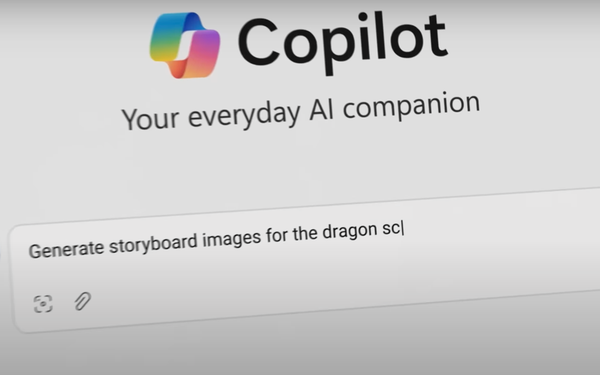
Microsoft introduced its latest
AI product on the Super Bowl
As often as the words “artificial intelligence” have cropped up in marketing conversations in the last year, you’d think chief
marketing officers would already be experts. But Chris Ross, vice president and analyst at Gartner, says that while CMOs everywhere are dabbling in AI, few have found meaningful ways to put it to
work. He tells Marketing Daily what’s holding them back.
Marketing Daily: How well is the typical American CMO using AI?
Chris Ross: All CMOs, whether they
are B2C or B2B, seem to be asking the same two questions. First, they want to know what's possible. They want to understand what’s out there, and what technology is available now and
what’s coming longer term. And then they want to know the risks. What kind of negative customer experience or consequences are possible?
advertisement
advertisement
Marketing Daily: Explain more about what
they see as possibilities.
Ross: One of the big trends is that they are trying harder to understand the AI they already own. That doesn’t get many headlines, but there is a lot of
AI woven into many of the major platforms. So they are doing audits to make sure that they understand how much AI potential is in the tech stack that they are already using. In most cases,
they’re forced to realize they’re not fully using the capabilities they’ve already purchased. So many are focusing on the AI tools that are in plain sight.
Next,
they’re looking for low-hanging fruit, like ways they can use AI to generate content or automate processes.
Marketing Daily: How’s that going?
Ross:
Interesting. Because it is so easy to create content with AI, the half-life of content possibly becomes shorter. But you might be expected to create 10 times more of it. It’s like, "Dig a ditch.
Fill it up. Dig a ditch."
And what will the expectations be if content quality is diminished? What impact will it have when we all start to say, “Meh, AI-generated quality is good
enough. It’s not going to be out there that long anyway”?
There will definitely be people who gravitate to brands that are more human, and not using AI in some detectable way.
Imagine people interested in a clean beauty brand, for instance. They’ll want a human-sounding experience.

Marketing Daily: Why are CMOs going so slowly?
Ross: One of the promises of AI is efficiency and effectiveness. But in the near term, there’s actually a lot of inefficiency, and a lot of investment required. And that’s one of
the biggest eye-openers. Near-term, AI is very messy.
My favorite analogy is the movable type used to print the Gutenberg Bible. That wasn't super-efficient. People didn't have printing
skills. It took many years before people got good at it. Obviously, it isn’t going to take 200 years for AI. But it is in the same Wild West stage. There are lots of tools. Some will last, some
won’t.
Marketing Daily: My favorite AI analogy is that rather than having an infinite number of skilled employees, it’s like having an infinite number of college interns.
Some are sharp, but many aren’t. AI is even less predictable -- it might lie, hallucinate or steal copyrighted material. That takes a lot of supervising.
Ross: Yes. Companies are
using AI to write product descriptions, for example, but there’s an inherent risk that AI won’t be accurate. Is it conflating descriptions? Is it describing one product when it was
directed to describe another? Are all the descriptions starting to feel synthetic?
Marketing Daily: In this “do more with less” corporate climate, many CMOs argue they need
more staff. But learning to use AI, sticking with the printing press metaphor, is labor-intensive. How are CMOs handling this? Are they hiring AI experts? Are they saying to certain staffers,
“Spend two days a week on AI pilots”? Or do they hope people will listen to some webinar and work it all on their own?
Ross: Mandates roll downhill. CEOs are saying, "Ok,
CMO, what are you doing to take advantage of AI?" So CMOs need good answers. They’ve got to understand what's out there, what's possible, what skills are required. Some are being very directed
about it, with specific training. Others are more organic. We see a lot of variation. Many are experimenting.
Marketing Daily: Can I challenge that? I feel like many CMOs I talk to
claim to have a “test and learn” approach to AI, when all they are doing is running small A/B tests of little consequence. Is anyone holding them accountable?
Ross: No. Some
organizations are truly walking the innovation walk, with experimentation woven into their cultures. Others are doing some tiny thing so they can check the box. I would say most marketing
organizations are pretty immature in this sense.
Take optimization. It’s been around a long time. Yet today, most organizations are relatively immature when it comes to personalization.
It shows -- we’ve all been on the receiving end of bad personalization.
Marketing Daily: Why the reluctance to experiment?
Ross: If you get it wrong, there are
public fall-on-your-face moments. Fails can create real operational problems. With AI, there can be privacy issues, and many legitimate concerns. That’s why so many CMOs want to experiment with
AI behind the scenes, in ways that aren’t customer-facing.
Marketing Daily: So CMOs are frustrated.
Ross: Yes. Our research shows we’re about to plunge into
this trough of disillusionment.